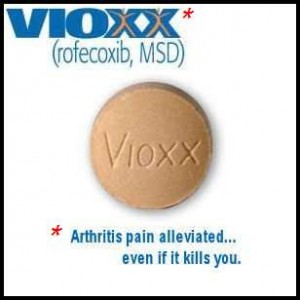Merck &. Co., Inc. announced on Sept. 30, 2004 that VIOXX® (rofecoxib), an arthritis and acute pain medication, would be withdrawn voluntarily worldwide. VIOXX was FDA approved as a new anti-inflammatory drug for osteoarthritis in 1999. Later it was also cleared for rheumatoid arthritis. As a Cox-2 inhibitor it was different from aspirin and the conventional anti-inflammatory drugs such as Naproxen, Motrin or Voltaren.
In a study called VIGOR , which is detailed more under this link, VIOXX was compared to Naproxen in terms of gastrointestinal side-effects. It was found that the risks of bleeding ulcers, perforation and bowel obstruction were 50% reduced (frequency of cases with naproxen 1.22% versus VIOXX with a frequency of 0.52%). Surprisingly, in this study of 4000 patients over 1 year the cardiovascular risks such as heart attacks, strokes, blood clots for VIOXX was 1.8%, 3-fold higher than Naproxen, which had only 0.6% such complications. In addition it was noted that high blood pressure was more common in rheumatoid patients. The FDA made Merck add a warning on the drug label regarding these added risks, but this went more or less unnoticed by the public.
It has been known for some time that aspirin (ASA) has polyp preventative action on the colon and thus reduces the risk of colon cancer. A specific study, called APPROVe (Adenomatous Polyp Prevention on VIOXX) trial, was designed to show that VIOXX could do the same as aspirin, but with less toxic side effects. In 2000 Merck started enrolling patients into this 3 year long trial.
After 18 months into the trial cardiovascular side-effects started to show up that were statistically significant when compared to controls. This is what prompted the recent press release that VIOXX would be taken off the market altogether.
More info on treatment of osteoarthritis: http://nethealthbook.com/arthritis/osteoarthritis/treatment-osteoarthritis/
Comments: One of the potential problems with receptor specific medications is that they can be so specific that the metabolism in the human body is changed. What’s good for the gut may not be good for the circulation, blood pressure and the heart. Merck did the right thing to withraw the medication altogether. It is not known at this time whether other similar medications such as Celebrex, which has a different molecular configuration, will stand up in the future to post-marketing testing.
Addendum on Nov. 6, 2012: In 2005 Bextra was also taken off the market by the FDA, but Celebrex was allowed to stay, but required to label their product with warnings about potentially serious side-effects.
Last edited October 27, 2014






